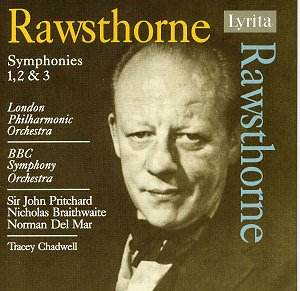Lyrita is back in action
and is in the process of re-releasing
their entire output of CDs. Among the
first to reappear is this significant
collection of all three of Alan Rawsthorne’s
symphonies. The disc is one of only
two complete single CD assemblies of
the symphonies. Its importance is a
documentary of three very different
examples of Rawsthorne performance and
as a fine example of the high quality
of performance and recording achieved
by Lyrita dating back to the vinyl era.
The Third derives from a Decca-Argo
LP.
The three Rawsthorne
symphonies chart a progressive growth
of harmonic and orchestral resource
used in the service of personal expression.
The First Symphony was written in the
composer’s mid-forties and incorporated
many of the lessons he had learnt in
writing for films. The first movement
immediate evidences the turbulence that
underlies the entire work with a moving
development of the second theme and
a profound coda. The slow movement continues
the unsettled feeling eventually leading
to a sense of hopelessness. The scherzo
is nominally cheerful, with beautiful
string writing, but the tension around
the note G, which has pervaded the entire
work, is not completely resolved in
the fourth movement and the coda leaves
the listener feeling no less uncertain
than at the work’s beginning.
It is probably unnecessary
to say that one should not confuse Rawstorne’s
Pastoral Symphony with that of
Vaughan Williams, even if both do share
a soprano in the last movement. The
Rawsthorne begins a little like his
First Symphony, but the foundation note
this time is E rather than G, which
makes for less turbulence. There is
also a greater freedom in the use of
harmony and the orchestration is masterly,
especially in its use of the horns.
The composer’s thinking has greatly
evolved in the nine years since the
previous symphony. Mournful horns begin
the second movement, the core of the
symphony. There is a march-like middle
section where it would be easy for the
conductor to lose track of the disparate
structural elements; Nicholas Braithwaite
has this movement totally under control.
This is some of the best conducting
to be heard from him on CD and the LPO
plays in complete accord with him. Increasing
harmonic resource is again demonstrated
in the third movement, a country dance
rather than a scherzo, although a country
dance à la Rawsthorne. The Andante
last movement begins with a reminiscence
of the melancholy of the first movement.
Trumpets take over to introduce the
vocal soloist who sings in praise of
summer. The movement ends as mysteriously
as it began.
In the Third Symphony
thematic and motivic fragments, so important
in the first two symphonies become the
corner-stone of the structure, although
a tone-row is used for development and
the work still has a foundation, again
around E. This recording was made only
three years after the premiere in 1964
and contains all the excitement attendant
on a new, major work. Norman Del Mar
delivers an extremely forceful performance,
although it lacks some of the grace
of the other two performances and the
recording sounds much more constrained
than for the LPO in the same venue in
the recording of Symphony No. 1. Many
listeners have found that much of the
opening Allegro sounds very different
from previous Rawsthorne, but this is
merely a product of the time it takes
to adjust to the wide range of things
happening in this movement. The second
movement is one of the most impressive
in all three symphonies, especially
the development of the tragic second
theme. This section‘s painful emotions
find repose at the end, but not without
an element of the macabre, a feeling
that also informs the scherzo, although
not in the sense one might expect, as
the scherzo is very quiet and a marvelous
example of thematic compression. The
concluding Allegro risoluto is a match
in quality for the slow movement. It
is a sort of rondo in which the subject
material is first developed and then
starts to disintegrate, ending with
a very hollow sound.
It is good to see that
Lyrita has made the Pritchard recording
sound brighter and more full-bodied
than was possible on the LP. The recording
of the Symphony No. 2 is of much more
recent vintage and was always very lifelike.
It doesn’t really need to be improved
upon. The recording of No. 3 is not
as life-like or impressive as that secured
some ten years later for Symphony No.
1, although the playing of the BBC Symphony
is quite good.
Admirers of Rawsthorne
will want to have this disc for both
its musical and documentary quality.
For the more general listener there
will probably be something of a conflict
between this disc and the recently released
disc by David Lloyd-Jones and the Bournemouth
Symphony. The latter has the advantage
of the low Naxos price and up-to date
recording. The Lyrita disc has the late
Tracey Chadwell in the solo part of
Symphony No. 2 and in fine form and
this will be a deciding factor for anyone
who is familiar with her musicianship.
William Kreindler
see also review
by Colin Clarke


